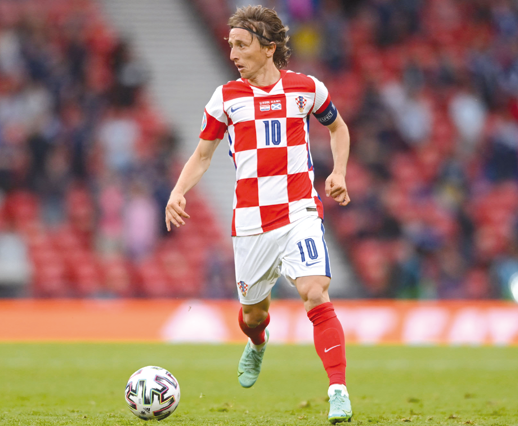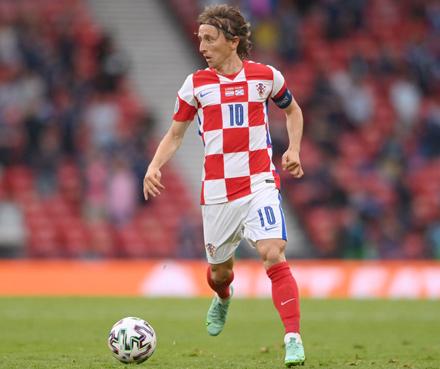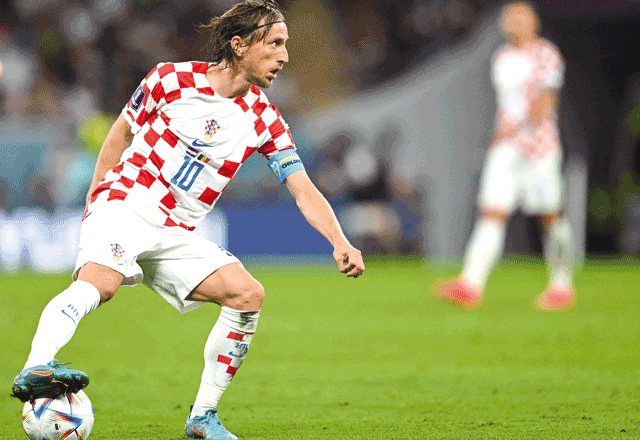You are here
Luka Modric: Croatia’s conductor in his last World Cup
By AFP - Dec 08,2022 - Last updated at Dec 08,2022

Croatia’s midfielder and captain Luka Modric (AFP photo by Stu Forster)
DOHA — Luka Modric said before arriving in Qatar that this World Cup would likely be his last major tournament and he has again orchestrated another deep run for Croatia.
The veteran midfielder’s side will face their biggest challenge yet when they take on Brazil in the quarter-finals on Friday.
The five-time champions sent out a warning to their fellow title hopefuls with a wonderful first-half display in their 4-1 victory over South Korea in the last 16.
But Croatia, the 2018 World Cup finalists, are likely to pose a far tougher test for the Selecao — seven of their past eight major tournament knockout ties have gone to extra time.
Modric is still the heartbeat of the team and coach Zlatko Dalic has said he expects the 37-year-old to be involved at next year’s Nations League finals.
But the Real Madrid midfielder does not see himself playing at a fifth World Cup, 20 years after his first, in 2026 in the United States, Canada and Mexico.
“I’m aware that I’m of a certain age and that this is my last competition in the Croatian national team,” he told FIFA before the tournament.
Modric still toils selflessly in midfield but was clearly fading when he was substituted in extra-time of Croatia’s last-16 win over Japan on penalties.
The Balkan nation will be counting on him to dig deep again, though, as he looks to replicate the form that helped Croatia reach the final in Moscow in 2018, where they lost 4-2 to France.
“When you see people like Luka Modric running and dying on the pitch, it gives us younger players extra energy to run,” said full-back Josip Juranovic.
Modric is a hero in his home nation after a 16-year international career in which he has made 159 appearances.
His trophy cabinet includes five Champions League titles with Real Madrid.
Humble beginnings
Modric broke Lionel Messi and Cristiano Ronaldo’s 10-year grip on the Ballon d’Or in 2018, when he also won the World Cup player of the tournament award.
Modric grew up during Croatia’s war of independence, between 1991 and 1995, during which his hometown, Zadar, and the surrounding region were heavily shelled by Serb forces.
Those experiences shaped Modric’s character and made him mentally strong, according to those close to him.
“It happened a million times that we were going to training as the shells were falling, and we were running to shelters,” said childhood friend Marijan Buljat, who trained and played with Modric while growing up.
“It is certainly one of the factors that contributed... that drove him to become one of the best in the world.”
Modric’s grandfather, after whom Luka was named, was killed by Serb forces, the house was burned out and the family fled to Zadar, 40 kilometres away.
“I’m sad that he [grandfather] didn’t get to see at least something of what I’ve achieved,” Modric told FIFA.
It was in Zadar that Modric, born in 1985, began his footballing odyssey, catching the eye.
“I heard about a little hyperactive boy constantly playing with a football in the corridor of a refugee hotel, even going to sleep with it,” said Josip Bajlo, who was then coach at NK Zadar.
Modric left Zadar as a teenager for Dinamo Zagreb and moved to Premier League club Tottenham in 2008, where he stayed for four years before moving to Spain.
Trees now grow inside the roofless ruin of his grandparents’ house, in the hinterland of the coastal town of Zadar.
“Mines — Keep out!” warns a sign next to the house, lying on a mountain road winding through the Modrici hamlet.
Its most famous son will be hoping to extend his final bid for World Cup glory on Friday.
Related Articles
GLASGOW — Scotland’s hopes of reaching the knockout stage of a major tournament for the first time were ended in a 3-1 defeat to a Luka Modr
DOHA — Croatia’s squad features only a few of the players which led them to the World Cup final in 2018, runners-up to France, but Luka Modr
DOHA — Lionel Messi and Argentina’s World Cup dream remains alive but an indefatigable Croatia side inspired by the enduring brilliance of L

















